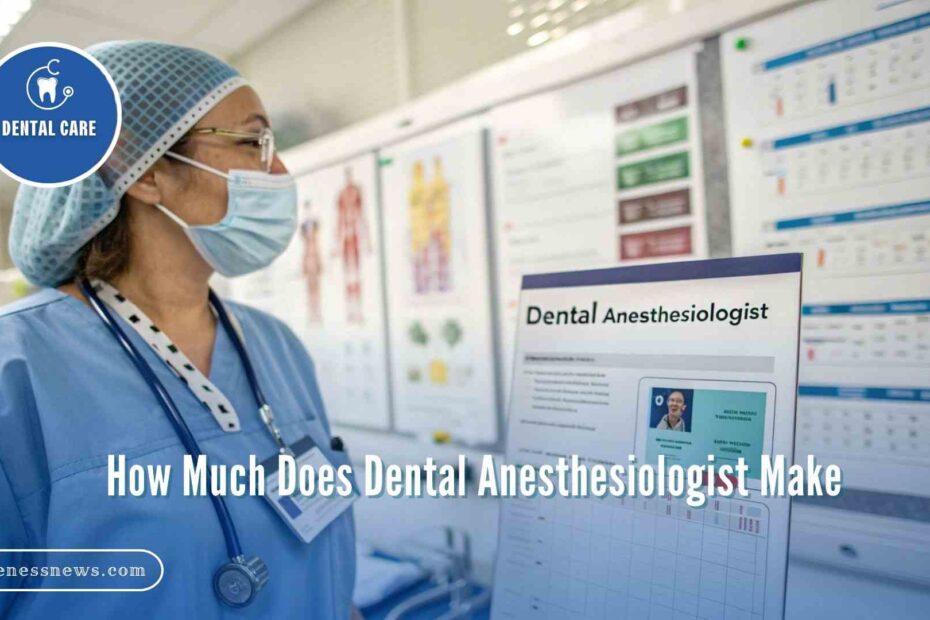Dental anesthesiologists in the U.S. make between $278,000 and $360,000 per year on average. Top earners in private practice can earn $400,000 or more annually.
Stay tuned with us as we dive into the world of dental anesthesiology and uncover the real numbers behind how much dental anesthesiologists make. You won’t want to miss this!
What Is a Dental Anesthesiologist?
A dental anesthesiologist is a licensed dentist who specializes in anesthesia and sedation. Unlike general dentists who may offer light sedation like nitrous oxide, dental anesthesiologists are trained to deliver:
- General anesthesia
- Deep sedation (IV)
- Monitored anesthesia care
- Pain and anxiety management during complex procedures
They often work with pediatric patients, those with special needs, or individuals with severe dental anxiety.
National Average Salary — How Much Do Dental Anesthesiologists Make?

As of 2025, the average annual salary for dental anesthesiologists in the U.S. falls between:
- $278,000 and $360,000 per year
In higher-paying regions or private practice settings, seasoned professionals can earn upwards of $400,000 to $500,000 annually.
Salary by Region: Where Do Dental Anesthesiologists Earn the Most?
Location plays a huge role in salary. Here’s a more detailed look at average salaries by region:
| Region | Average Salary |
| West (CA, WA, OR) | $350,000 – $400,000 |
| Northeast (NY, MA) | $340,000 – $390,000 |
| South (TX, FL, GA) | $270,000 – $320,000 |
| Midwest (IL, OH, MI) | $280,000 – $330,000 |
| Southwest (AZ, NM) | $260,000 – $310,000 |
Urban vs Rural: Major metro areas often offer higher salaries but may come with increased competition. In contrast, rural communities may offer incentives like sign-on bonuses, housing assistance, or student loan repayment to attract specialists.
Salary by Experience Level:
| Experience Level | Estimated Salary |
| Entry-Level (0–2 yrs) | $220,000 – $260,000 |
| Mid-Level (3–9 yrs) | $270,000 – $330,000 |
| Senior (10+ yrs) | $350,000 – $450,000+ |
With growing experience, anesthesiologists can move into leadership roles, private practice ownership, or even consulting for dental surgery centers—each offering opportunities to raise income significantly.
Income Based on Work Setting:
Let’s take a closer look at how the work environment can influence salary:
| Work Setting | Average Salary |
| Private Dental Office | $300,000 – $400,000 |
| Dental Surgery Center | $280,000 – $350,000 |
| Hospital (Outpatient/ER) | $250,000 – $320,000 |
| Academic or Teaching Role | $180,000 – $250,000 |
| Locum Tenens / Freelance | $150 – $250 per hour |
Education & Training Costs: Is It Worth It?
Becoming a dental anesthesiologist is a serious commitment, both in terms of time and finances.
Educational Pathway:
- Bachelor’s Degree: 4 years
- Dental School (DMD/DDS): 4 years (~$250,000 tuition average)
- Anesthesiology Residency: 2–3 years
Estimated Cost of Becoming a Dental Anesthesiologist:
| Expense | Estimated Cost |
| Undergraduate Degree | $40,000 – $80,000 |
| Dental School Tuition | $200,000 – $400,000 |
| Residency Stipends (minimal) | Low income |
| Licensing & Certification Fees | $5,000+ |
While upfront costs can be high—sometimes totaling $400,000+—the long-term earning potential makes this a high-ROI profession.
Dental Anesthesiologist vs Other Dental Specialists:
Here’s how dental anesthesiologist salaries stack up against other dental professions:
| Dental Role | Average Salary (2025) |
| General Dentist | $160,000 – $220,000 |
| Endodontist | $230,000 – $300,000 |
| Orthodontist | $270,000 – $350,000 |
| Oral Surgeon | $300,000 – $500,000+ |
| Dental Anesthesiologist | $278,000 – $400,000+ |
Dental anesthesiology sits near the top tier, thanks to its advanced training and relatively low number of professionals in the field.
Pros and Cons of Becoming a Dental Anesthesiologist:
✔ Pros:
- High earning potential
- In-demand specialty
- Ability to work in multiple settings
- Rewarding patient outcomes, especially with anxious or special needs patients
❌ Cons:
- Long and expensive education path
- High liability and responsibility
- Physically and mentally demanding
- Requires continuing education and certification
Industry Trends — The Future of Dental Anesthesiology!
With rising awareness around dental anxiety, special needs care, and complex surgical interventions, demand for dental anesthesiologists is expected to grow steadily through 2035.
Emerging trends include:
- Mobile dental anesthesia services
- Telehealth pre-op consultations
- Integration of AI and patient monitoring technologies
- Expanded insurance coverage for sedation dentistry
Real-Life Example: Case Study Salary Breakdown
Let’s look at an example:
Dr. Karen L., Dental Anesthesiologist in New York City
- Private practice + consulting in surgical centers
- 10 years of experience
- Earns approx. $415,000/year
- Works 4 days/week, with flexibility for teaching at a dental college
This hybrid model allows her to maintain work-life balance while maximizing income.
FAQ’s
1. How Is a Dental Anesthesiologist Different from a Medical Anesthesiologist?
While both professionals specialize in anesthesia, dental anesthesiologists focus solely on dental and oral procedures. They train in dental-specific sedation techniques and understand the complexities of the oral cavity, jaw, and airway in relation to dental surgeries. Medical anesthesiologists, on the other hand, are physicians who work across various surgical fields in hospitals.
2. Can Dental Anesthesiologists Bill Insurance Separately?
Yes, in many cases, dental anesthesiologists can bill separately from the dentist or oral surgeon for their services. Whether insurance covers it depends on the patient’s plan, the medical necessity of sedation, and whether it’s a medical or dental policy. Medicaid and special needs policies often provide broader coverage.
3. What Skills Are Essential for Success in Dental Anesthesiology?
Key skills include advanced knowledge of pharmacology, airway management, patient assessment, quick decision-making, and the ability to handle emergencies. Strong interpersonal skills are also crucial—especially when working with anxious patients, children, or individuals with special needs.
4. Is There a High Risk of Malpractice in This Field?
Yes, dental anesthesiology carries a higher liability risk than general dentistry. Mistakes in sedation or anesthesia can lead to severe complications. As a result, dental anesthesiologists often pay more for malpractice insurance and must adhere strictly to safety protocols and emergency preparedness standards.
5. Are There Subspecialties or Advanced Certifications Within Dental Anesthesiology?
While dental anesthesiology is a specialized field itself, professionals can pursue advanced certifications in pediatric anesthesia, pain management, or sedation safety. Some also take courses in new technologies like AI-assisted monitoring or advanced airway techniques to stay at the forefront of their field.
Conclusion:
Becoming a dental anesthesiologist takes time, money, and dedication—but the rewards are big. With high pay, flexible job options, and growing demand, it’s a career that offers both purpose and stability. If you enjoy helping people feel safe and calm, this path might be perfect for you.
More Articles:
